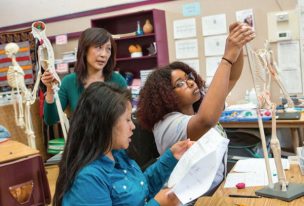How Can Inquiry Support New Teachers?
Often, new teachers spend their first school year feeling overwhelmed. Learning new curriculum, lesson planning, understanding school wide systems, and developing classroom management expertise add up to many moving parts for new teachers to hold while they are held accountable for making sure that their students actually learn something. Most often they are left to struggle through these things alone. Although programs for beginning teacher induction provide support, many new teachers often feel like the task is so overwhelming that support is not enough.
In an article posted on Edweek Richard Ingersall described the situation like this, “Although elementary and secondary teaching involves intensive interaction with youngsters, the work of teachers is done largely in isolation from colleagues. This isolation can be especially difficult for newcomers, who, upon accepting a position in a school, are frequently left to succeed or fail on their own within the confines of their classrooms—often likened to a ‘lost at sea’ or ‘sink or swim’ experience.”
Through participation in a Mills Teacher Scholars inquiry group, new teachers become a part of a collaborative community of teachers who are learning together. There are several core elements of the inquiry process that particularly support new teachers.
Grounding in Routine
At our earliest inquiry sessions we guide teachers to choose an instructional routine connected to a data source that can ground their inquiry over the course of the year. This conversation with newer teachers proves to be quite fruitful, although initially it is often filled with comments like, “I don’t know what my routines are” and “I am not sure what you mean by routine.” In our inquiry sessions veteran teacher colleagues and Mills Teacher Scholar facilitators encourage new teachers to describe their practice and name the activities that come up often and ground their interactions with students . One new teacher realized, for example, that the partner work she asked students to engage in during math time was a routine she was implementing that she could begin to support more thoughtfully and explicitly.
In last year’s closing survey one teacher reflected, “My entire class benefited from my Mills work. I focused on creating routines and by doing so my students became more successful.” Teachers commented on how beneficial it was to allow them to choose the routine they wanted to develop and come back to it throughout the year. It deepened their understanding of how routines support students academically.
Regularly Scheduled Conversations with Colleagues
Our inquiry groups typically meet once a month. A routine part of this time is looking at data and thinking about data with colleagues. In this space a new teacher has the opportunity to look at data and plan next instructional steps alongside colleagues at the same school. The teacher is able to bring their inquiry, instructional routine, and data to colleagues and say, “Here is what I need help with today….”
In the midst of all the things that they are holding and all other decisions they are making, the inquiry space provides new teachers an opportunity to focus in and gain traction on a particular area of practice. Teachers are able to think deeply about one particular area of practice, and then reflect and refine that practice with gentle, supportive nudges from colleagues. Another first-year teacher commented that the inquiry space is “giving me support in talking about my thoughts and ideas on how to move forward. It’s giving me space to explore new ideas and talk about successes and struggles.” With the routine of inquiry teachers are able to refine their instructional practices to the benefit of their students.
Promoting Feelings of Professionalism
New teachers often comment on the feeling of professionalism fostered in the inquiry group as they support one another to strengthen their practice. They note the feeling of community and the ways in which they feel safe to explore and discuss dilemmas of practice in these sessions. Teachers share how often they are being asked to turn in this set of scores, implement this type of curriculum, do this type of lesson with your kids, plan this kind of intervention, and how all those things leave them feeling a lack of agency.
The shift in the inquiry space is that although teachers are thinking about how they will implement the curriculum, plan the intervention, and gather the data, they are choosing the framing of that conversation and deciding on what the next steps will be. They are listening to one another and holding the conditions required for their colleagues to stretch themselves and learn. For new teachers, who leave teaching at alarming rates, this feeling of professionalism is an important connection to teacher retention. “Having the time and space to be reflective has been very valuable,” noted a new teacher in her end of year survey. “I felt valued as an educator and was bolstered by the support of my colleagues.”
New Teachers in the Driver’s Seat
Although inquiry for new teachers may feel overwhelming initially, it can be a powerful professional experience when flexibly supported. Allowing teachers– no matter where they are in their practice –to choose a professional learning path and to have some say in what is grounding their focus for the year puts them in the driver’s seat of deepening their practice and growing as professionals.
Aija Simmons is Mills Teacher Scholars Associate Director of Teacher Leadership. In addition to supporting our Teacher Scholar Leader Network, she has facilitated inquiry groups in various districts across the East Bay that included new teachers and is a Common Core Teacher Leader for Oakland Unified.


